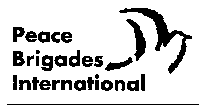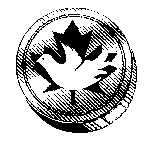 Peace Brigades International is a unique organization - one which has made a difference in the lives and hopes
of people from Guatemala to Sri Lanka.
Peace Brigades International is a unique organization - one which has made a difference in the lives and hopes
of people from Guatemala to Sri Lanka.PBI was founded in the summer of 1981 on Grindstone Island by a group of Canadians which included Murray Thomson of Ottawa Friends Meeting and eleven others. The other founders were Hans Sinn, of Perth, Ontario, Narayan Desai (the son of one of Gandhi's secretaries), Jaime Diaz from Bogota, Columbia, and three other Friends, Charlie Walker of Philadelphia, Dan Clark from San Francisco, and Lee Stern of the New York area. JoLeigh Commandant, a Toronto Quaker, became the first staffer of PBI's Central American program.
"It was based on the experience of many of those founders in other, similar organizations, such as the World Peace Brigade, inspired by nonviolent proponents such as Gandhi and Martin Luther King, and its purpose was to experiment with nonviolent international peace initiatives," said Alan Dixon, the North American Project co-ordinator of PBI.
The first project opened in 1983 in Guatemala, and was followed by projects in El Salvador, Sri Lanka, North America, Columbia, and Haiti.
Alaine Hawkins, a Toronto Quaker, was the coordinator of the Central America Project in from 1986 to 1991.
Contact: PBI Canada, 192 Spadina Rd., Ste. 304, Toronto M5T 2C2 - (416) 594-4429
 Peacefund Canada was founded in 1985 by a group of Canadians which included a number of Quakers. Its purpose
was to encourage and support education programs which challenge people to believe in and work for peace.
Peacefund Canada was founded in 1985 by a group of Canadians which included a number of Quakers. Its purpose
was to encourage and support education programs which challenge people to believe in and work for peace."The fund itself came out of a weekend in Orillia. We met in the home of Gordon and Jane Ball, two ex-CUSO volunteers who lived in same community co-op as Ed and Vivien Abbott of Simcoe-Muskoka Friends Meeting, " Murray Thomson recalled.
Budd Hall, the staffperson for the International Council of Adult Education, proposed the project to his association, the Canadian Association for Adult Education, and the Quebec-based equivalent, and they agreed to sponsor the fund jointly.
The beneficiaries of the fund are usually individuals working on small, specific concerns. About 350 projects have been supported by the fund in 35 countries.
Among those in past years benefitting from Peacefund Canada funding were Karen Ridd, a Peace Brigades International volunteer in Guatemala, and Joseph Chandrakanthan, a Sri Lankan priest who has sought to bring trust and understanding among the groups in conflict in his country.
Contact: Peacefund Canada, 145 Spruce, Suite 206, Ottawa K1R 6P1, Phone at 613-230-0860, Fax 613-563-0017.
Toronto Friends Fred Franklin and Nancy Pocock were among those at that meeting. At the same time that this meeting brought together members of the historic peace churches (Mennonites, Dukhobors, Quakers and Bretheren), the Canadian Council of Churches had started another program, which they called Canadian Defence Alternatives. The two groups were merged, and eventually took the name Project Ploughshares.
Contact: Project Ploughshares - Conrad Grebel College, Waterloo, Ontario N2L 3C6 - Phone (519) 888-6541
Project Ploughshares has a World Wide Web site at Project Ploughshares in Waterloo, Ontario, Canada
Ed Bell and Philip L. Martin, two Ottawa Friends, originally took on this responsibility.
Between 1988 and 1991, Quaker Peacemakers organized two student exchanges between students in the then-Soviet Union and Canada, to allow Canadian and Soviet students to get to know each other and the other's country.
When the Berlin Wall came down in November, 1989, signalling the end of the Cold War, the work of Quaker Peacemakers changed. They began working on Canadian government and Non-Governmental Organizations Human Rights consultations and the Quaker United Nations Office in Geneva. During the United Nations' fiftieth anniversary in 1995, they are working to raise the profile of the United Nations among Canadian Friends
The Quaker Peacemakers today are Ed Bell and Carol Dixon.
Contact: Quaker Peacemakers, 91A Fourth Avenue, Ottawa, Ontario, Canada K1S 2L1
 Conscience Canada Inc. was incorporated in 1983, as an outgrowth of the Peace Tax Fund Committee,
which three Quakers founded in Victoria, British Columbia, in 1977. The three friends were Edith Adamson, a
long-time member of Ottawa Friends Meeting who had moved to Victoria, Ian Gibson, and Dorothy Webster.
Conscience Canada Inc. was incorporated in 1983, as an outgrowth of the Peace Tax Fund Committee,
which three Quakers founded in Victoria, British Columbia, in 1977. The three friends were Edith Adamson, a
long-time member of Ottawa Friends Meeting who had moved to Victoria, Ian Gibson, and Dorothy Webster.The three met and drew up a statement, which they presented to Victoria Monthly Meeting. In January, 1978 they mailed it to all Friends Meetings in Canada. An editor of the Victoria Times-Colonist happened to attend meeting, saw this statement, and wrote an editorial about the peace tax for the Colonist. In 1980, the group heard that freedom of conscience was to be included in the Canadian Charter of Rights and Freedoms.
Their first test case under the Charter was that of Dr. Jerilynn Prior, a member of Vancouver Friends Meeting. Thomas Berger defended Jerilynn Prior all the way the Supreme Court. Between 1984 to 1991, the Supreme Court twice refused to hear the case.
Since 1982, Conscience Canada has maintained a Peace Tax trust fund in which peace trusters have deposited the military portion of their taxes as a protest against paying for war. This account had a balance of $63,660 at the end of 1994. The group is supporting the efforts of NDP MP Svend Robinson to introduce a Private Member's Bill later in 1995 to establish the peace tax for Canadians, and is also working with MPs from the Liberal Party to encourage them to make the peace tax a real alternative for Canadians. Jane-Orion Smith of Halifax Monthly Meeting is the current co-ordinator.
Conscience Canada, P.O. Box 8601, Victoria Central P.O., Victoria, B.C. V8W 3S2 - (604) 384-5532